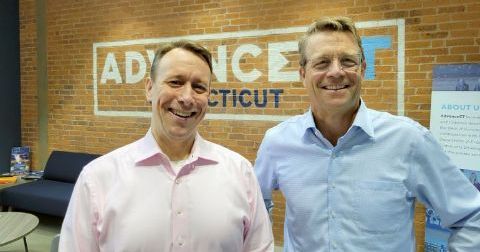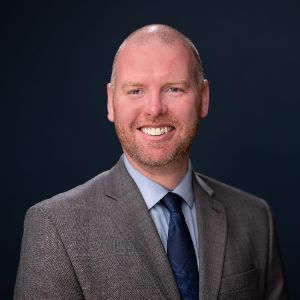Alexandra Daum is the commissioner of the Department of Economic and Community Development, which contracts with AdvanceCT to handle business recruitment and retention.
Outgoing AdvanceCT Chief Denious Sharpens State's Sales Pitch Over 4 Years

8 Aug 2023
News
HBJ PHOTO | MICHAEL PUFFER
In the four years since Peter Denious left a venture capital firm to become head of the Connecticut Economic Resource Center, he’s helped reshape the organization’s name and mission.
Denious, 56, oversaw CERC’s rebrand to AdvanceCT, and shifted the private nonprofit’s focus beyond a research and troubleshooting call center for businesses, to being a far more prominent part of the state’s efforts to recruit, retain and grow companies.
Today, staff maintain ongoing discussions with hundreds of businesses, not only helping them access state assistance and programs, but reporting out their concerns and suggestions to state officials with the power to create policy changes and financial support.
AdvanceCT has also developed stronger ties with site selectors and out-of-state companies, staff say, to ensure Connecticut is on the radar of businesses looking to relocate to, or add a presence in the Northeast.
“We had to fight back,” Denious said of competition with other states. “For a long time, Connecticut didn’t have to do that. Right up until the global financial crisis, everything was great. We had over 30 Fortune 500 companies. We were kind of king of the hill.”
Denious announced last month he will be stepping down as CEO in September. He recently sat down with the Hartford Business Journal to reflect on his past four years in the role.
He will be replaced by John Bourdeaux, AdvanceCT’s current president and head of business development.
During Denious’ tenure, AdvanceCT has grown from about 14 to 22 employees, all but three of whom are new, while its budget doubled to just under $5 million.
More than half of that funding comes from nearly 50 companies that provide financial support. That’s up from just a couple utility company contributors when Denious started, he said.
The organization’s board is now made up of some of the state’s highest-profile executives, including co-chair Margaret Keane, the former CEO and current executive board chair of Stamford financial services company Synchrony Financial, as well as the CEOs of Stanley Black & Decker, Otis Worldwide Corp., and Charter Communications.
AdvanceCT also has a far closer relationship with the state Department of Economic and Community Development, along with improved collaboration with workforce training centers, higher-education institutions and other arms of state government.
Big wins
AdvanceCT’s 2022 annual report touts its role in helping support 2,400 new jobs and $1.7 billion in announced capital projects for business investment and expansion.
The report claims an assist in several big developments, including a $200 million, 1,000-job expansion of advanced technology manufacturer ASML in Wilton; medical researcher Cure Rare Diseases Inc.’s decision to build a 30,000-square-foot lab in Woodbridge; and Australian defense contractor Birdon’s purchase of two marinas in Portland to satisfy a $190 million rescue boat repair and retrofit contract with the U.S. Coast Guard.
“The biggest difference was CERC was more of a passive organization,” said AdvanceCT board member Jim Smith, the former CEO and chairman of Webster Bank who now runs a bank consulting firm, JC Smith Advisors. “It did good research, but it was not active in business development.”
Smith, along with former PepsiCo CEO Indra Nooyi, was hand-picked by Gov. Ned Lamont to lead the AdvanceCT board as it transitioned to a more active business recruitment role.
Together, they hired Denious.
“Ned’s vision was to have a business-driven, private not-for-profit focused on business development and marketing of the state that would work in partnership with the state,” Smith said. “It probably has 15 or more people in the market every day talking to businesses. They have talked to thousands of businesses in the last four years. That wasn’t happening before.”
AdvanceCT used its expanded outreach and connections to collect feedback that informed Lamont’s $1.7 billion, five-year economic development plan, which was rolled out in 2021. It aimed to partner state dollars with private investment to create new jobs and housing that made the state a more attractive place to live and work.
The plan included the Department of Economic and Community Development’s $100 million Connecticut Communities Challenge grant program, which invests in transit-oriented development and other housing projects.
DECD Commissioner Alexandra Daum’s agency has a roughly $2 million annual contract with AdvanceCT to handle business outreach and recruitment.
Daum, who joined DECD three years ago, said she’s seen a “steady march” in AdvanceCT’s capabilities and reach. The organization is a reliable conduit between the state and businesses, she said.
“I know when I turn a company over to AdvanceCT, they are going to get great concierge service,” Daum said. “This will make sure they know someone here cares and will get back to them.”
Of course, there were some stumbling blocks during Denious’ tenure, including two announced high-profile business relocations out of Connecticut.
In January, Danish toymaker LEGO Group said it planned to relocate its North American headquarters and about 740 jobs from Enfield to Boston by 2026. Denious, at the time, said he and other state officials were caught off-guard by that announcement.
In that same month, Campbell Soup Co. announced it was relocating the Norwalk headquarters of its Pepperidge Farm subsidiary to New Jersey.
Something to crow about
Bourdeaux, who has a background in fundraising, will take over for Denious in late September.
Prior to joining AdvanceCT in 2021, Bourdeaux served as vice president of advancement for the Connecticut Science Center. He was also formerly director of development at Hartford Stage, and served in the development offices of the University of Chicago, The Hotchkiss School (a boarding school in Lakeville, Conn.), and Yale University, where he was responsible for securing philanthropic funding.
Bourdeaux said he’s not planning any major changes at AdvanceCT because the organization has adapted well to its new role.
He will try to find efficiencies that allow for greater impacts. He also believes AdvanceCT, and Connecticut in general, must do a better job trumpeting the state’s successes and qualities.
The lack of promotion could be tied to traditional Yankee reserve, he said. It’s a charming bit of modesty, but perhaps not the best economic development policy.
Having grown up in Atlanta, Bourdeaux said he doesn’t have that problem.
“The way the Southeast built economic development is they worked very hard and marketed what they hoped would happen as a fait accompli,” Bourdeaux said. “In Connecticut, we don’t brag about what we have been doing for (over) 200 years.”
Connecticut has more reliable water reserves and infrastructure than many other parts of the country. It has top-notch education, workforce training pipelines and quality-of-life amenities. And it has long been an innovator in manufacturing and other fields, Bourdeaux said.
Those are the talking points he will continue to emphasize as he promotes the state to companies inside and outside Connecticut.
“I’m much more likely to brag about what’s going on in Connecticut,” Bourdeaux said. “I don’t know if it’s because I grew up in the Southeast and was trained to be a braggart. I think it is because we have something to brag about.”
More Topics

AdvanceCT Launches New Workforce Resource Guide
Jul 11 2023
AdvanceCT Announces Leadership Transition
Jul 6 2023
.png)








